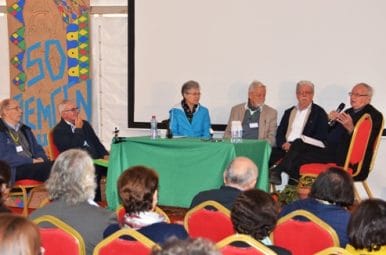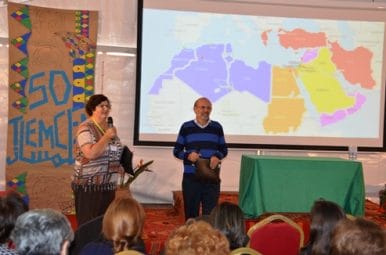 The event was attended by 90 Muslims and Christians from Jordan, Syria, Libya, Greece, Tunisia, France, Italy, Switzerland, Burkina Faso, Canada and Algeria. Four topics were discussed: suffering in light of God; the divine inspiration on unity in Chiara Lubich; the challenges and problems for the contemporary Muslim; being builders of universal brotherhood. The most repeated word at the conference was “together” which highlighted the experience that has been maturing for years in the heart of the Focolare Movement: Christians and Muslims living the ideal of unity together, according to the charism given by God to Chiara Lubich fully accepting their individual identities and differences. Chiara’s deep mystical experience from the summer of 1949 was introduced by Jésus Morán and welcomed by the participants in an atmosphere of deep fraternity: “Chiara takes us into the God of Oneness, beyond the differences of single religions,” said Jalleh who is a Sciite from Iran. Someone else remarked: “Chiara uses images that are understandable when talking about the Trinity.” Rita Moussallem and Roberto Catalano, who work for the Movement’s interreligious dialogue, presented the Focolare’s experience with different religions around the world: “You could say that God manifested himself and gave us all a bit of his light,” said one participant. After an immersion in the unity that is born from the Christian context, the focus shifted to Islam. The Algerian-Tunisian scholar Adnane Mokrani, who teaches as the Pontifical Institute of Arab and Islamist Studies at Rome (PISAI), talked about the crisis that Islam is going through today. She invited the audience not to allow itself to be taken in by the different conspiracy theories, not to blame others, but to return to the discussion table, without being discouraged: because “the majority of the people want peace, perhaps an inactive majority … But it’s up to us,” she emphasized, “an active minority to do all that we can to arouse that majority. It’s our task.”
The event was attended by 90 Muslims and Christians from Jordan, Syria, Libya, Greece, Tunisia, France, Italy, Switzerland, Burkina Faso, Canada and Algeria. Four topics were discussed: suffering in light of God; the divine inspiration on unity in Chiara Lubich; the challenges and problems for the contemporary Muslim; being builders of universal brotherhood. The most repeated word at the conference was “together” which highlighted the experience that has been maturing for years in the heart of the Focolare Movement: Christians and Muslims living the ideal of unity together, according to the charism given by God to Chiara Lubich fully accepting their individual identities and differences. Chiara’s deep mystical experience from the summer of 1949 was introduced by Jésus Morán and welcomed by the participants in an atmosphere of deep fraternity: “Chiara takes us into the God of Oneness, beyond the differences of single religions,” said Jalleh who is a Sciite from Iran. Someone else remarked: “Chiara uses images that are understandable when talking about the Trinity.” Rita Moussallem and Roberto Catalano, who work for the Movement’s interreligious dialogue, presented the Focolare’s experience with different religions around the world: “You could say that God manifested himself and gave us all a bit of his light,” said one participant. After an immersion in the unity that is born from the Christian context, the focus shifted to Islam. The Algerian-Tunisian scholar Adnane Mokrani, who teaches as the Pontifical Institute of Arab and Islamist Studies at Rome (PISAI), talked about the crisis that Islam is going through today. She invited the audience not to allow itself to be taken in by the different conspiracy theories, not to blame others, but to return to the discussion table, without being discouraged: because “the majority of the people want peace, perhaps an inactive majority … But it’s up to us,” she emphasized, “an active minority to do all that we can to arouse that majority. It’s our task.”  She and Adnane Mokrani answered several spontaneous questions from the audience. Scholar of Comparative Religions at the University of Amman, Jordan, Amer Hafi said: “God is great[er] means that he is greater than our fears, than our problems and misfortunes: God is the key of our hope and of our life. But unfortunately this invocation has become a death signal.” The presence of Emeritus Archbishop Henri Teissier with his in-depth knowledge of Islam was deeply appreciate, along with Bishop of Orano, Jean Paul Vesco. He explained: “the friendship founded on spiritual communion is the apex of dialogue among the religions and their differences.” The young Algerian Muslims from the Focolare Movement provided music and song. The visit to the mausoleum of mystic Sidi Boumediène, which was presented by Algerian scholar Dr Sari-Ali Hikmet, immersed the conference members in the spirituality, art and culture of Islam. This was followed by a visit to the El Mechouar Museum, a palace from the Zianide Dynasty, and a visit to the Great Mosque and to the modern Andalusi Centre of Studies. Before leaving Tlemcen, Jesús Morán commented on the experience: “It wasn’t only getting along, but of being one, sharing the same experience of God, of sharing what we have deepest inside of us.” Jean-Louis Marechal
She and Adnane Mokrani answered several spontaneous questions from the audience. Scholar of Comparative Religions at the University of Amman, Jordan, Amer Hafi said: “God is great[er] means that he is greater than our fears, than our problems and misfortunes: God is the key of our hope and of our life. But unfortunately this invocation has become a death signal.” The presence of Emeritus Archbishop Henri Teissier with his in-depth knowledge of Islam was deeply appreciate, along with Bishop of Orano, Jean Paul Vesco. He explained: “the friendship founded on spiritual communion is the apex of dialogue among the religions and their differences.” The young Algerian Muslims from the Focolare Movement provided music and song. The visit to the mausoleum of mystic Sidi Boumediène, which was presented by Algerian scholar Dr Sari-Ali Hikmet, immersed the conference members in the spirituality, art and culture of Islam. This was followed by a visit to the El Mechouar Museum, a palace from the Zianide Dynasty, and a visit to the Great Mosque and to the modern Andalusi Centre of Studies. Before leaving Tlemcen, Jesús Morán commented on the experience: “It wasn’t only getting along, but of being one, sharing the same experience of God, of sharing what we have deepest inside of us.” Jean-Louis Marechal
Put love into practice
Put love into practice




0 Comments